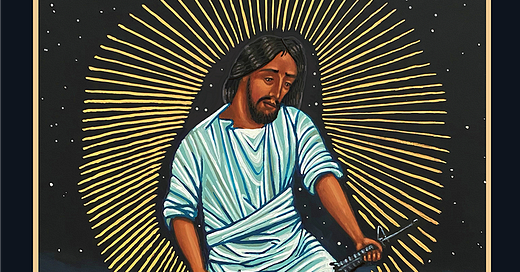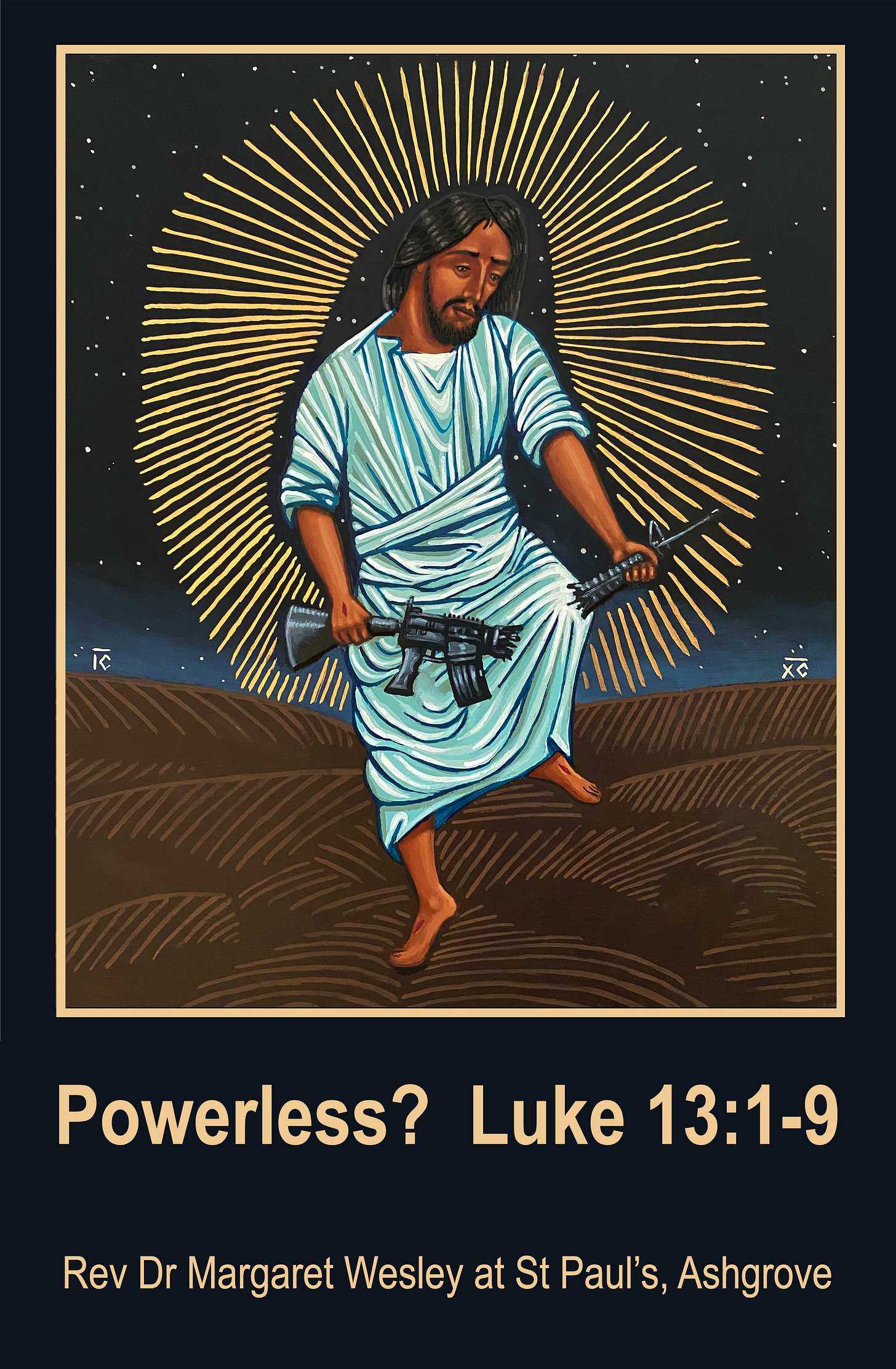We live in big times.
Perhaps that’s always true. I am sure it’s always true somewhere. But - for me, at lease - it felt for a long time like the world was reasonably stable.
When I was a kid, life was overshadowed by the fear of nuclear apocalypse. Us ordinary people felt powerless as world leaders seemed to be walking a tightrope where their slightest slip might take the whole world down with them into a deep and airless abyss.
As I became a teenager and an adult I grew out of that fear and began to develop a sense of agency in a world that felt uncertain but not acutely frightening. More immediate concerns dominated my attention for decades.
Perhaps that has been the case for you as well.
Lately, the sense of the powerlessness of ordinary people has been growing again, as capricious world leaders show a callous disregard for the suffering they cause. In this climate, ordinary people find it hard to work out what to do. We meet and say to one another, ‘Have you heard about the latest thing such-and-such has done? Did you see the destruction in such-and-such place?’
Just like that, we read in Luke:
“At that very time there were some present who told Jesus about the Galileans whose blood Pilate had mingled with their sacrifices.” (Luke 13:1)
Pilate is the Roman governor who will soon condemn Jesus to crucifixion, so Luke brings him into the story here to highlight the violent forces Jesus is dealing with during this time.
It seems that these people are saying that Pilate had executed Galilean Jews while they were in the act of presenting sacrifices in the Temple.
We have accounts of Pilate’s atrocities outside the New Testament, but none of them refer to an event like this. Of course, a lot of things happened 2,000 years ago that never made it into the history books, so it may have happened or it may have been a rumour that these people were passing on. Whatever it was, they would have been watching Jesus to see how he would respond to this accusation against the governor.
Would he defend the Roman occupying forces?
Would he openly criticise the governor?
Would he give the people purely spiritual comfort?
Or would he go so far as to declare that something had to be done to put a stop to Pilate’s atrocities. Was he – and all his followers with him – ready to join in a revolt against Rome?
Will he join the fight against tyranny, or will he stand by and let the tyrant keep killing his people?
***
Do you remember how you felt in the days and weeks after the attack on the Twin Towers in the US in 2001? I’m sure you do. We were concerned for the families of the 3,000 people who died, but we were much more concerned for the exponentially greater number that would almost certainly become casualties of a US retaliation. And the past 24 years have shown those fears to be well founded.
When Jesus heard about this latest atrocity from Pilate, he would have experienced similar emotions. He was fully human. He would have felt all the grief and outrage that any Galilean would feel about this attack on his fellow Galileans. But the pain didn’t blind him to that other reality – that retaliation won’t fix anything and will probably make everything a whole lot worse.
This bind was expressed succinctly for me last week when I was reading the latest book from my long-term mentor, Parker Palmer:
“Violence is what happens when we don’t know what else to do with our suffering.” (On the Brink of Everything)
When we feel powerless, when we can’t see any other option, we resort to violence. But whenever we start to walk down that path, Jesus calls us to turn around:
I tell you; unless you repent, you will all perish as they did.
We can reasonably assume that these people Pilate executed had resisted Roman rule in some way and that Pilate made an example of them. They were from Galilee, so when the news reached back to their home villages you can imagine the anger that would be felt. And when people can’t find anything else to do with their suffering, violence is always crouching at the door.
Jesus asks them if those Galileans who were slaughtered had committed any sin that made them particularly deserving of their fate. Of course they hadn’t. ‘So’, he says to the people who approached him, ‘You need to turn around because if you continue on the path you are on, you will march straight towards the same fate.’
Repent. Turn around. Or you will all perish as they did.
And those who stayed on that path did perish. Within four decades.
But let’s back up a bit.
Do you think that because these Galileans suffered in this way they were worse sinners than all other Galileans? 3 No, I tell you
Of course we don’t know what they did, other than to reasonably assume they had opposed the governor in some way. Did that make them worse sinners than the majority who remained passive and obedient? Jesus says ‘No!’
We need to hear that.
There is a persistent heresy that aligns God’s power with human power. In the past it has sometimes been called the divine right of kings. It goes way back beyond the Christian, or even the Israelite era, to nation states where kings and gods were almost seen as interchangeable. Obeying the king and obeying the god amounted to the same thing. This ideology was consistently opposed in the Jewish Scriptures where the prophets criticised and opposed the kings. In our Scriptures, God and kings are almost never aligned.
Those of Jesus’ generation who wanted to take up arms against their oppressors probably saw themselves and the descendants of those prophets. And there are people like that in every place of powerlessness. And along with them is their opposite. The heresy that sees God standing behind all human power is still alive and well today among certain Christian groups.
Our Scriptures encourage us to obey the laws of our land, not because God rules through them but because when good laws are agreed to and honoured by the whole community, that community has a chance of flourishing.
But when dictators oppress the most vulnerable community members instead of supporting them, then it is no longer our duty to obey their laws.
Jesus says these people were not especially sinful. The problem wasn’t a lack of lawfulness, it was a lack of wisdom. When you have an oppressor as powerful as the Roman Empire, you must be very careful how you oppose them. The Galileans Pilate had executed should serve as a warning. Unless you repent – unless you turn from your thoughts of armed rebellion – Pilate will execute you as well.
Jesus is always opposed to the use of violence, and in this situation in particular, violence could be guaranteed make things worse. This is not an enemy that can be defeated through violence. Jesus has another way. He will defeat the Roman Empire, but he’ll do it slowly over centuries and then all at once.
Then Jesus tells them about another group of people who had died traumatically. This time a tower fell on them. Again, we don’t have any record of this event outside the Gospels, but I’ll give you my best guess for what might have happened:
There is a record of Pilate stealing funds from the temple to build an aqueduct from Siloam to Jerusalem. The Jews were outraged. So, any Jew involved in the construction may have been seen as a collaborator. It seems that there was an accident – or maybe an act of sabotage – in which a tower fell on some construction workers. Jesus asks
do you think that they were worse offenders than all the others living in Jerusalem?
Well, Jerusalem was full of collaborators. At least, that’s what Galileans would have thought. Just like Queenslanders think Canberra is full of corruption.
‘Unless you repent’, he said ‘you will all perish just as they did.’
If you fight against Pilate you will die like the Galileans. If you collaborate with the Romans you will die like the Judean construction workers. This doesn’t leave much room to move. It feels like a ‘damned if you do, damned if you don’t’ kind of scenario – which is exactly what it always feels like to be powerless. So, he tells them a story to show that there is another way.
A man had a fig tree planted in his vineyard; and he came looking for fruit on it and found none. 7 So he said to the gardener, ‘See here! For three years I have come looking for fruit on this fig tree, and still I find none. Cut it down! Why should it be wasting the soil?’ 8 He replied, ‘Sir, let it alone for one more year, until I dig around it and put manure on it. 9 If it bears fruit next year, well and good; but if not, you can cut it down.
A vineyard is a very common image in the Bible for the Jewish people. Pilate had been brought from Rome and planted as a foreign leader in God’s vineyard. His leadership was fruitless, and a lot of people wanted to get rid of him. But the gardener decided the fate of the plants there. Not Pilate. Not the Roman emperor. And not the vines either. Not the Jewish people.
This Gardener declares that the fig tree should be given more time, but that its time will run out if it continues to be fruitless.
Because Pilate was given more time, he was still governor when Jesus was brought before him and then he bore the fruit we know him for. A few years later he was recalled to Rome, and there is no further record of his life. But his name is forever associated with tyranny and injustice. How many people call their sons Pilate, even today?
This parable isn’t just about Pilate, though. It applies just as much to Herod or to the Roman Empire. It applies to every imposition of power over powerless people.
But does that help us when trying deal with the tyrannical leaders and unjust power structures that are proliferating in our world today? Does it help us in all of the more personal ways we feel powerless? Jesus doesn’t give an easy or comfortable answer: No armed uprising. And no collaboration. That leaves us on a narrow road – a thin space in which to look for something more creative and constructive to do with our suffering.
And it leaves us with confidence that God will never let tyrants have the last word. They will do their worst for a day or a year or a decade or a millennium, but their day will end. And God will still be on the side of the powerless and oppressed. And God will still be God. Amen.
With Love from Rev Margaret
Image, Christ Breaks the Rifle, by Kelly Latimore, Purchased by Rev Dr Margaret Wesley and used with permission





